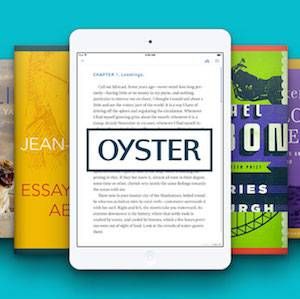
Bust Into New Genres with Oyster’s Ebook Subscription Service
This post is sponsored by Oyster.
Oyster offers readers the opportunity to browse thousands of titles whenever and wherever the urge strikes them. They offer immediate and unlimited access to more than 500,000 titles, ranging from familiar favorites to books from across the genre spectrum. Readers will find award-winners and bestsellers and the titles that have been staring at them from bookstore displays, begging to be read. Their time has finally come.
Oyster is designed specifically for reading on-the-go, with apps available for iPhone, iPad, and iPod Touch.
_________________________
I’ve been using Oyster since it launched last fall, way back before it was a Book Riot sponsor, and one of my favorite things–and, I think, one of the best things–about the service is how easy Oyster makes it to try new books and genres. It’s an all-you-can-read model for $9.95 a month, so if you start reading a book and just aren’t digging it, you can move on to something else without feeling like you wasted your hard-won book dollars. Experimentation becomes a low-risk possibility, and you can expand your readerly horizons in all kinds of new directions.
If, like me, you’re looking to bust into new genres, here are some recommendations from Oyster’s digital library.
Since we’re talking about trying out books you haven’t wanted to commit to before, it’s probably appropriate to begin with a Big, Long Classic. Oyster has its own specially designed edition of Moby-Dick, so you can chase the white whale and be free to bail if you wanna.

Speaking of books that get short shrift, we need to have a serious talk about how SO MANY readers (and so many authors of so many click-bait editorials) still labor under the misperception that books about young adults are only for young adults. Silver Sparrow by Tayari Jones is one beautiful example of the books–and they are myriad–that tell coming-of-age stories and tackle big, important issues. Readers of all ages will find value and insight within these pages.
Readers of all ages will also love A Series of Unfortunate Events. I held out on reading these for SO LONG because sometimes I forget how great kids’ books can be. Don’t be like me. Read these!

For a look at sex and relationships through the lens of science rather than imagination, dig into Sex at Dawn by Christopher Ryan and Cacilda Jetha. This book is so packed with interesting tidbits about sex and culture, you’ll be stocked with dinner party anecdotes for several years.
Did a bad experience in school ruin you for the notion that educational reading can be fun? You might love The Canon: A Whirligig Tour of the Beautiful Basics of Science by Natalie Angier. Angier is a veteran science reporter with a charming voice and a knack for explaining big concepts in language that is straight-forward but not dumbed down. She trusts her readers to be smart, and she rewards them for their attention with funny asides and stories from her career.
For readers who love science and research and examining human behavior, Dan Ariely’s Predictably Irrational is a must. We humans like to think our decisions are rational, but, well, there’s a whole lot of evidence (many of it from Ariely’s fascinating studies) to the contrary. You’ll see your brain and behavior in a whole new light.

Just when I thought the vampire story had been totally played out, I fell for The Strain by Guillermo del Toro and Chuck Hogan. These aren’t traditional vampires in the blood-sucking, cloak-wearing sense, but they are every bit as mean and terrifying, and they are blessedly devoid of sparkling sense and romantic sensibilities.
If you just read that vampire recommendation and were all, “Keep the vampires, but I’ll take the suspense,” then I want to point you in the direction of Shutter Island by Dennis Lehane. Go ahead and forget the movie with Leonardo DiCaprio. This is weird, page-turning stuff with surprises you won’t see coming.

Have you been using Oyster to try out new books? Tell us about your adventures!


















